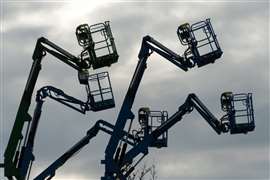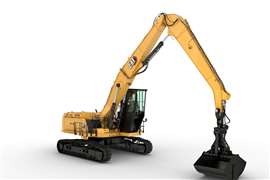Read this article in French German Italian Portuguese Spanish
What sanctions could companies found to be ‘dumping’ cheap machinery into EU and UK face?
08 December 2023
 Image: Dmitri Kotchetov via AdobeStock - stock.adobe.com
Image: Dmitri Kotchetov via AdobeStock - stock.adobe.com
Last month saw the high-profile launch of investigations into so-called’ dumping’ of low-cost industrial and construction equipment into the European and UK markets.
While the European Commission announced a probe into imported mobile access equipment from China, the UK’s Trade Remedies Authority started an investigation into ‘dumping’ of excavators.
In both cases, the fear is that low-cost machinery that has been dumped into those markets or imports that have been subsidised in their manufacture, could cause harm to home producers of the same product, whether in the European Union (EU) or the UK.
Until the relatively recent past, following Brexit, issues affecting the UK market were also dealt with by the European Commission.
While there doesn’t appear to have been a directly comparable precedent involving construction equipment in recent years, the EC has conducted hundreds of anti-dumping investigations on a variety of products from non-EU countries, ranging from cast iron items, to tyres for buses, to rainbow trout.
And in many cases, it has taken action, which comes in the form of anti-dumping duties.
“If dumping is found and the EU industry is suffering injury as a result of these dumped imports, the outcome of the investigations may be the imposition of anti-dumping duties, which are additional customs duties paid upon the import of the affected product into the EU, in order to offset the dumping,” a Commission spokesperson explained.
“Before any measures are imposed, the Commission examines whether it is in the EU’s interest to remedy the effects of any such unfair practices by imposing anti-dumping duties, i.e. whether such possible measures would not lead to any disproportionate consequences and impact on EU importers, users and consumers.”
What form have past anti-dumping measures taken?
Where the EC does take action, it is usually in the form of provisional measures first, followed some time afterwards by ‘definitive measures’.
The time it takes between the initiation of an investigation and any eventual provisional measures varies but can often take in excess of a year.
They are accompanied by lengthy and complicated documents that weigh up the interests of different parties including industry in the EU, users, importers under investigation, and unrelated importers.
They also consider the extent of the ‘injury’ that home producers are suffering.
Then, depending on the outcome, the EC may decide to impose ‘anti-dumping duties’
These appear to vary significantly on a case-by-case basis. Taking the example of birch plywood from the Russian Federation, the Commission decided in November 2021 to impose duties on three particular companies ranging from 14.4% to 15.8%. All other companies from Russia were slapped with duty of 15.8%.
Separately, an anti-dumping investigation into ceramic tiles from the People’s Republic of China resulted in definitive anti-dumping duties on three different Chinese ceramics companies ranging from 26.3% to 36.5% in 2011.
And in the case of hand pallet trucks, definitive measures in 2005 imposed duty rates on four companies ranging from 7.6% to 39.9%, along with 46.7% for all other companies.
The UK’s Trade Remedies Authority, established in 2021 following Brexit, has adopted a similar approach. As an example, it decided to impose a tariff of 18.4% to 22.5% on certain types of reinforced steel from China in March 2023, following the start of an anti-dumping investigation in April 2021.
It’s important to note that both the EC’s investigation into alleged Chinese dumping of mobile access equipment in the EU, and the UK’s ‘anti-dumping’ investigation into Chinese excavators have only just started.
Neither investigation has yet concluded that dumping has taken place and neither the EC nor the Trade Remedies Authority have given any indication as to what potential action they could take until they make a decision on the investigations.
Asked whether the European Commission would open its own investigation into dumping of excavators, spokesperson said, “As regards any future investigations under both WTO and EU legislation, the Commission cannot comment unless a decision is made to open an investigation.”
STAY CONNECTED



Receive the information you need when you need it through our world-leading magazines, newsletters and daily briefings.
CONNECT WITH THE TEAM












